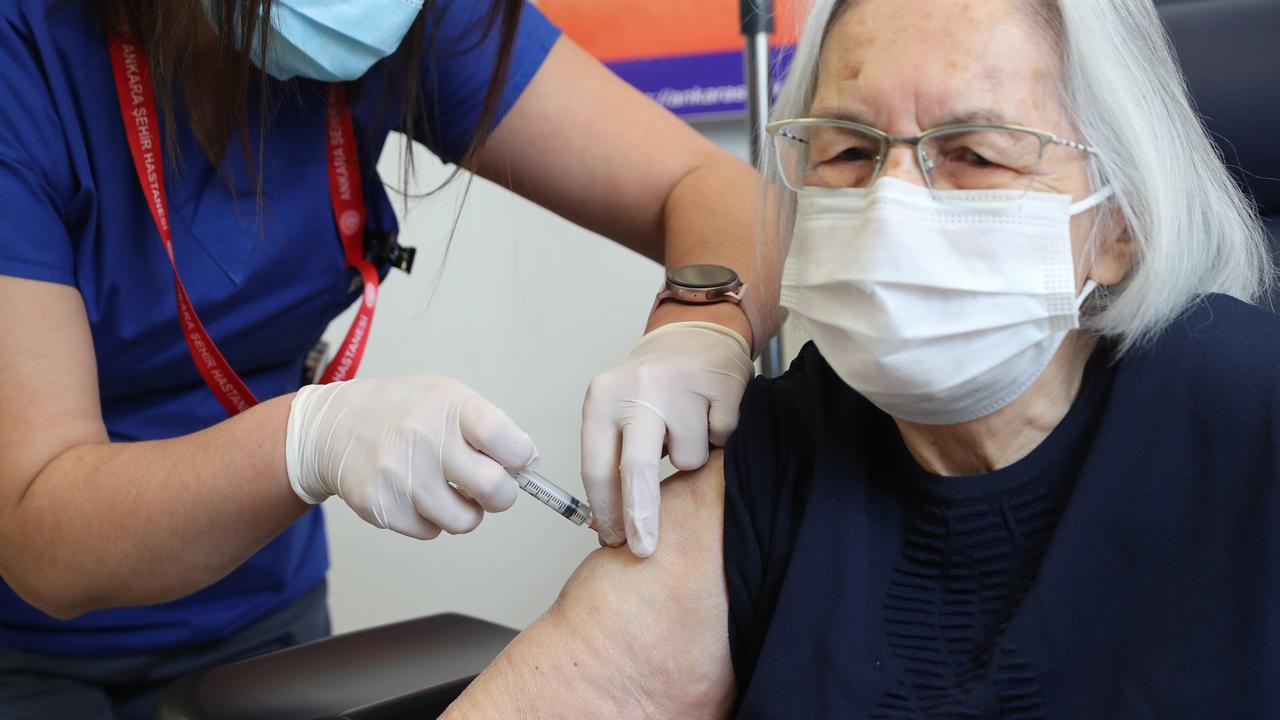Andrew Bolt: We must learn to live with COVID
Of course vaccines are still our biggest hope, but don’t expect coronavirus to be gone by year’s end. Or for years to come.
Time for a Plan B. The evidence is growing that vaccines won’t end this coronavirus nightmare as our politicians dreamt.
So if we don’t stop waiting to be saved by a miracle vaccine, this year could look awfully like lockdown-2020.
Be clear: I am not saying the vaccines are useless.
In fact, the real danger is that there’s so much anti-vaxxer talk that we won’t get enough people — more than 90 per cent — taking them to give us herd immunity.
But that’s far from the only problem now emerging with the vaccines.
For a start, we don’t know how good they are at protecting exactly the people most likely to be killed by the coronavirus.
Last Friday, French President Emmanuel Macron even claimed the AstraZeneca vaccine was actually “quasi-ineffective for people over 65”.
Germany’s vaccine commission meanwhile advised against using it on older people, saying there was “insufficient data” on its effectiveness on people over 65. (AstraZeneca insists its drug works well.)

Other key questions remain unanswered.
How long do you stay protected once vaccinated? No one yet knows. Three months? A year?
And how well do vaccines work against the variants of this fast-mutating virus?
That question is becoming urgent. The Novavax and the Johnson & Johnson vaccines, for instance, seem to be much less effective against the new South African strain. Novavax claimed its vaccine was 89 per cent effective in Britain, but in South Africa just 49 per cent.
Moderna and Pfizer/BioNTech say their own vaccines protect against the South African variant, but this virus is mutating with incredible speed.
Doctors in the Lancet journal last week warned that a new strain is running riot in the Amazonian city of Manaus, where an estimated 76 per cent of the population had already recovered from the virus and supposedly became immune.
For the city’s hospitals to be now overwhelmed with a second wave was “unexpected and of concern”, the Lancet authors said.
True, they said, the previous rate of infections could have been exaggerated. But they also suggested patients perhaps weren’t immune for long after recovering.
Or, most worrying, maybe the virus could mutate into forms that past antibodies can’t fight.
But there is also another problem, raised by a prominent Australian immunologist, Emeritus Professor Robert Clancy, former head of the Newcastle Mucosal Immunology Group.
Few Australians realise these vaccines don’t actually stop most people being infected. They mostly stop them feeling sick.
Clancy checked reviews of three vaccines — Oxford, Pfizer, Moderna — and says “the vaccines give little (at best 50 per cent) protection against infection”, as opposed to preventing “clinical symptoms”.
A vaccine might well save you from having to go to hospital, but not necessarily stop you being infectious. Which means the virus stays out there.
Of course, vaccines are still our biggest hope, provided we keep updating them as we do the flu virus.
But don’t expect the virus to be gone by year’s end. Or for years to come.

So what is Plan B?
First, we must learn to live with the virus. To be more like NSW and less like Queensland or Victoria.
We must fight virus outbreaks with better contact tracing and quarantine, plus protection of the elderly, rather than with economy-crippling bans on movement and business.
But, second, we must get serious about finding good treatments, not just good vaccines.
That means ending a lethally stupid battle in the culture wars. The one over hydroxychloroquine.
Hydroxychloroquine is a widely used and relatively safe anti-malarial drug that was recommended by President Donald Trump to treat coronavirus. He took it himself.
But this was the hated Trump talking. So journalists and health bureaucrats demonised the drug, despite growing evidence that it — in combination with zinc — stopped many people early in the disease from getting seriously sick and dying.
In mad Victoria, for instance, hydroxychloroquine was banned.
True, hydroxychloroquine doesn’t work in the late stages of the virus, but as Professor Clancy points out, “every study of early treatment” — 27 so far — “has shown protection”. The case for hydroxychloroquine, as well as ivermectin, a common anti-lice drug in combination with zinc, is “irrefutable”.
And guess what? Last month, with Trump gone, the American Journal of Medicine published a paper saying hydroxychloroquine saved lives, while Facebook last week dropped its ban on posts saying so.
How many patients died in the meantime, as the media sneered at a cheap treatment and chased the mirage of a Big Pharma vaccine that would solve everything?



